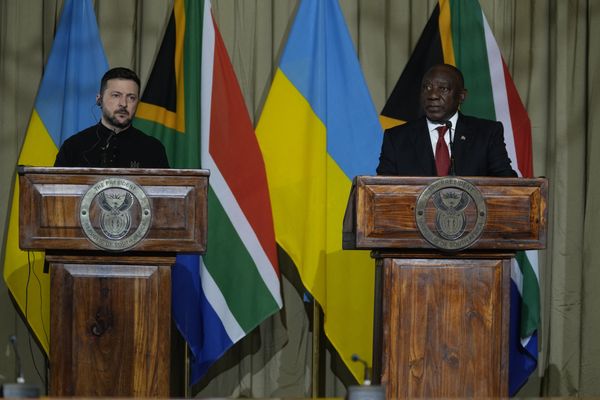Nearly two thirds of people in regional NSW and half of regional Victorians are worried about the impact of large-scale renewable projects on wildlife and the environment.
As Australia moves away from fossil fuels to renewable energy, new polling shows 60 per cent of regional NSW and half of regional Victorians are also concerned about a lack of compensation for land owners directly affected by wind turbines, batteries, solar farms and transmission lines.

Over three days in early May and late April, pollsters at Essential Media surveyed 1126 people across four states on behalf of ZEN Energy, to find out how they felt about the transition.
Don't tell us, work with us
The results show most people - between 70 and 83 per cent, depending on the state - back government-owned renewable energy.
While there is also support for Australian companies controlling power generation, far fewer people want foreign businesses or governments behind renewables.
There were notable differences in opinion between regional areas and cities.
In regional NSW, 22 per cent saw decreasing energy costs for households as the biggest economic benefit of renewables, compared to 17 per cent in metropolitan areas.
As debate over the federal Coalition's support for nuclear rages, reducing the impact of climate change was key for up to one quarter of people surveyed.
In both metropolitan and regional areas the most popular form of consultation was community partnership and collaboration.
'They don't care'
Near Oberon on the NSW central tablelands west of the Blue Mountains, a proposed large-scale wind farm in state forests has locals up in arms.
Forestry Corporation of NSW in late May gave European company TagEnergy a permit to investigate building an undetermined number of turbines at Black Springs.
The structures would be up to 300 metres tall - roughly the equivalent of Sydney, or Centrepoint, Tower.
The Pines Wind Farm was one of four permits granted after the former NSW Coalition government opened up select land in state forests for renewable energy projects.

Oberon Against Wind Towers, a group that has been campaigning against another wind farm plan, is outraged.
"What they don't take into account is social impact and economic impact," group spokesman Chris Muldoon said.
"They don't care. They're chasing wind; they're chasing a deadline. They don't care."
Community consultation is 'a crock'
Mr Muldoon said the Oberon plateau had thriving tourism and agricultural industries as well as many hobby farmers who'd escaped the city for a quieter life.
He said people felt "helpless" when a region was chosen for renewables - and companies looking to make a profit had no stake in the local community's future.

"They're not from here. They do not care about the environmental, the cultural, the social impacts, economic impacts.
"Consultation is a crock. There is no consultation," he said.
The Australian company, Stromlo Energy, tasked with investigating the wind farm disagrees.
"Stromlo Energy has had staff in the community on almost every day [since May 23], presented to councillors on three occasions and, by the end of July, will have hosted four community drop-in sessions," a spokesperson said.
The company had two Bathurst-based staff and was offering every Oberon household $100 off their power bill, they said.
"Stromlo Energy want[s] to meet and talk with everyone in the community. All questions are welcome."
Ignore locals at your peril
Renewable projects could be better run with local buy-in, RE-Alliance national director Andrew Bray said.
He said the wind farm plans in Oberon were "emblematic" of why some projects did not "fly with the community".
"In this case, a whole lot of work was done by a government agency in the dark and then, by the time the announcements came on board ... a whole bunch of stuff was already in place," Mr Bray said.
"So community just wasn't part of that initial discussion."
What do we want? An airstrip and more childcare
A renewable energy advocacy group, RE-Alliance has been working with the people of Hay in south-western NSW whose town sits in a renewable energy zone in the path of a new transmission line stretching from South Australia to Wagga.
Mr Bray said local leadership was a "vital ingredient" in the success of a renewable energy project.
Community sessions in Hay involved answering questions and asking what the people wanted.
It turns out Hay wants an airstrip to drive economic development and accessibility, so that hope has been put to developers.
The town also wants more childcare and better housing and telecommunications.
"Respect the fact you're building in their backyard and take them on the journey," Mr Bray said.
"By ignoring the community aspect of this [governments have] created a social licence rod for their back."
Better leadership on renewables
The Essential polling shows more Victorians - 28 per cent - say the government has not led strongly enough on the energy transition compared to 24 per cent in NSW.
Overall, roughly one quarter of Australians are concerned renewables technology and the infrastructure to support it aren't advanced enough to support the transition away from fossil fuels.
Renewables already account for 39.4 per cent of Australia's electricity supply, according to the Clean Energy Council.
In April the CSIRO found more than 80 per cent of Australians would at least tolerate living within 10km of renewable energy infrastructure.
The Essential research was commissioned by ZEN Energy, a renewables provider with plans to develop a 1000-megawatt pumped hydro station at Lake Burragorang, connected to Warragamba Dam, Sydney's main drinking water supply.
Under the proposal, ZEN says it would supply 500,000 homes and businesses with power in western Sydney.
ZEN Energy chief executive Anthony Garnaut said only "genuine partnerships" with community would earn renewable projects a social licence.
"ZEN understands this is a transition that cannot afford to fail," he said.
"We encourage all developers to engage early, involve people in decision-making and codesign of projects."
- with Matthew Watson







